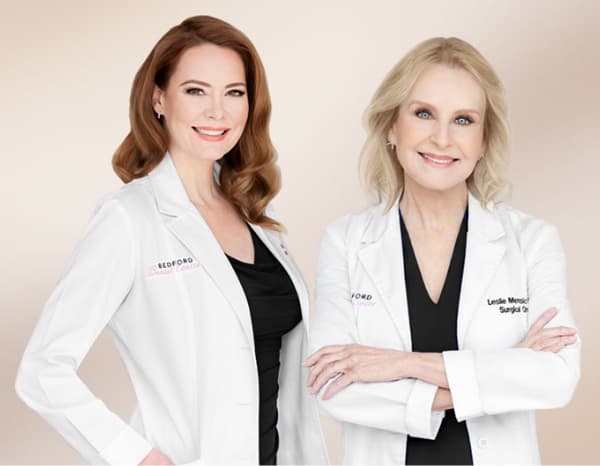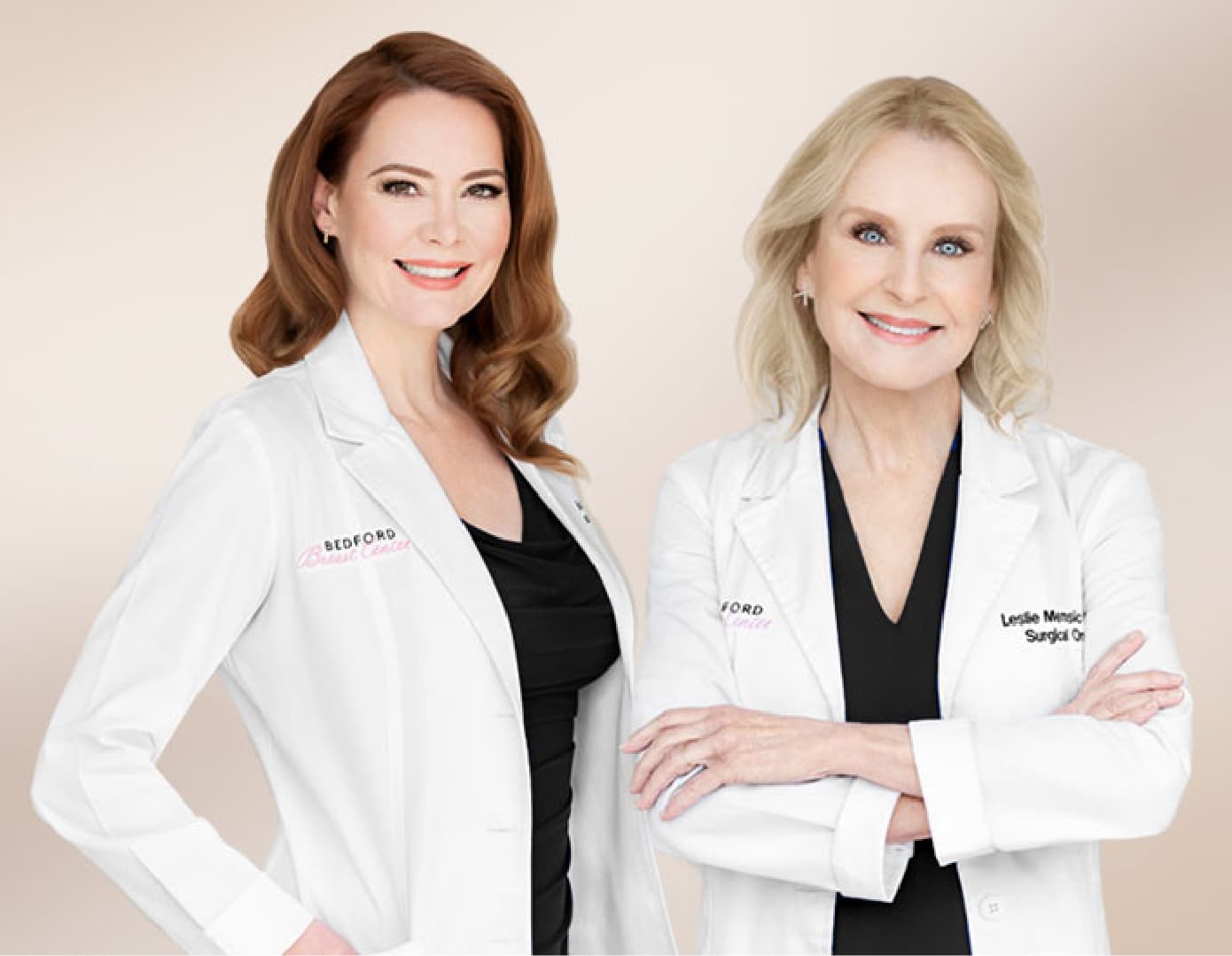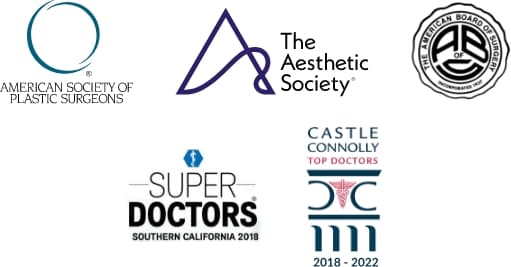Dr. Richardson and Dr. Memsic are two of the top breast surgeons in Los Angeles, using innovative techniques to create excellent clinical and aesthetic outcomes.
Schedule a Visit
Bedford Breast Center
436 N Bedford Dr, Ste 308
Beverly Hills, CA 90210
Phone: (310) 278-8590
Monday – Friday: 9 a.m.– 5 p.m.
Breast Cancer Prevention
What can you do to prevent breast cancer? At our Los Angeles breast center, this is a common question, which makes sense considering American women have a 1 in 8 chance of developing this disease. And while there is no surefire preventive measure that applies to every woman, there are ways you can take charge of your health and reduce your risk of developing breast cancer.
Reduce Breast Cancer Risk With a Healthy Lifestyle
You can’t alter your genetic makeup, but you can focus on making behavioral choices that reduce your risk of developing breast cancer. In addition to living a healthy lifestyle, it’s essential to know your medical history and risk factors, perform breast self-exams, and get regular screenings.
Maintain a Healthy BMI
Women who are overweight or obese have an increased risk of developing breast cancer compared with women who maintain a healthy weight. This risk increases with the amount of excess weight gained during adulthood.
Consume a Nutritious, Balanced Diet
Breast cancer is linked to diets high in sugar, fat, and processed foods. Eating a variety of natural foods, especially vegetables and fruits, can help you maintain a healthy weight and lower your risk of developing breast cancer.
The American Cancer Society recommends the following:
- Limit intake of red meat, especially beef and pork, and avoid processed meats (hot dogs, bologna, sausage).
- Choose fish, poultry, or beans instead of red meat.
- Eat more fruits and vegetables.
- Eat at least two servings of grains daily (at least half should be whole grains).
- Drink plenty of water every day.
A healthy diet helps prevent breast cancer and can also help you manage your weight, reduce your risk for heart disease, and lower your chances of developing diabetes.
Exercise Regularly
Exercise is one of the best things you can do to help prevent breast cancer. Research has shown that regular exercise can reduce your risk of developing breast cancer by up to 50%. It can also increase your energy levels and improve your overall quality of life.
Exercise may help prevent breast cancer by:
- Aiding in maintaining a healthy weight. Overweight women have higher levels of circulating estrogen and are at greater risk for developing breast cancer than women with normal or low body fat—particularly after menopause. Weight loss can help lower overall estrogen levels in overweight postmenopausal women.
- Lowering insulin levels. Women with high insulin levels have been found to have an increased risk of breast cancer compared with those with lower levels. Exercise reduces insulin levels by improving insulin sensitivity in muscles and fat cells (where most excess sugar is stored), reducing sugar cravings, and improving blood glucose.
- Reducing stress. Stress hormones have been linked to increased estrogen levels in women over 40.
Limit Alcohol Consumption
Alcohol consumption is associated with an increased risk of developing breast cancer. The more alcohol you drink, the higher your risk of developing breast cancer.
Alcohol may increase your risk for breast cancer in several ways:
- Alcohol can increase the amount of estrogen in the body, making some people more likely to develop new cancers or recurrences after treatment for early-stage disease.
- Alcohol can affect fat storage in the body, leading to weight gain and increasing breast cancer risk. Alcohol-related weight gain may be due to a high-calorie diet and lack of exercise, but it could also be linked to increased levels of estrogen released by fat cells.
- Alcohol can cause liver damage. If the liver is damaged from drinking too much alcohol, it can’t process estrogen properly, which increases the amount of estrogen in the body and raises the risk of breast cancer.
Quit Smoking
Smoking has been implicated in increasing cancer risk and is proven to cause lung and heart disease. In fact, cigarette smoking is widely considered the world’s most significant preventable cause of death.
Consider Your Hormone Replacement Therapy Options
Studies by the Women’s Health Initiative found that women taking hormone replacement therapy (HRT) have an increased risk of developing breast cancer, particularly if they’ve taken the treatment for five years or more.
Managing hormone intake is essential, particularly after menopause. Not every woman needs HRT once they reach menopause. Speak with your doctor about menopausal symptoms, including hot flashes, insomnia, mood changes, vaginal dryness, and weight gain. In some cases, non-hormonal methods may help alleviate the issues.
While some women may need HRT to alleviate postmenopausal symptoms and maintain their quality of life, it’s typically best to take the lowest dose that brings relief and limit use to the shortest possible time. Your doctor can help you assess your symptoms and breast cancer risk factors and work with you to find your best treatment options.
Other Lifestyle Factors
Vitamin D has been proven to be important in bone and breast health. Supplementation is often recommended to meet minimum daily requirements. Antioxidants such as vitamin C, E, and Coenzyme Q10 may also aid cancer prevention.
Minimizing stress is vital to a healthy body, requiring a thoughtful assessment of your lifestyle to make impactful changes. We all live with some stress we can’t eliminate, but other stressors can be managed or reduced. Allowing yourself time daily to engage in relaxing or enjoyable activities, such as reading, meditating, or exercising—even for as little as 10 minutes per day— can reduce stress.




Reduce Breast Cancer Risk Through Knowledge, Self-Exams, and Screenings
Know Your Family History
Talk with your doctor if you have a family history of breast or other cancers. You may benefit from closer surveillance (more frequent exams or imaging studies) or BRCA genetic testing. Don’t be afraid to ask your relatives about their health issues. Their health history is your history, and knowledge is power.
Know Your Body
Regular breast self-exams are a step you can take to safeguard your health. Regular breast self-exams will acquaint you with how your breasts normally look and feel. This will help you recognize if changes occur, such as lumps, dimples, or nipple discharge. See your doctor if you notice anything unusual.
Get Professional Screenings
In addition to regular self-exams, annual breast cancer screenings can help identify abnormalities early. Our world-class Beverly Hills center offers breast cancer screenings, including mammograms and ultrasounds, to help maintain your breast health.
Imaging studies, such as screening mammograms, complement breast exams. Annual mammograms are ordinarily recommended for most women beginning at age 40. Your doctor may recommend starting screenings earlier if you have certain risk factors.
For patients with dense breast tissue or those with certain risk factors, ultrasound may be recommended if masses are identified upon physical examination or imaging.
Magnetic resonance imaging (MRI) is a highly accurate screening test. MRI is typically performed after other tests have identified possible abnormalities. However, an MRI may be indicated for women at higher risk—such as those with a personal or strong family history of breast cancer, carriers of BRCA gene mutation, or women with extremely dense or cystic breasts.
Preventive Measures for High-Risk Patients
Anti-Hormone Therapy
Anti-hormone therapy is a treatment used to prevent recurring cancer or the development of another primary cancer. The majority of breast cancers have estrogen receptors that respond to anti-hormone drugs such as Tamoxifen, which block hormones that are known to assist cancer cells in growing or developing. Learn more about anti-hormone therapy here.
BRCA Genetic Testing
BRCA genetic testing finds mutations in BRCA1 and BRCA2 genes that put you at an increased risk of female breast and ovarian cancers. Normal BRCA 1 and 2 genes produce a tumor-suppressing protein. When they are mutated, this protein is not being produced or no longer working as intended, increasing the potential for tumor growth.
Preventive Mastectomy
Women with a highly elevated risk of developing cancer may consider prophylactic (preventive) mastectomy. Those with a very high risk include:
- Carriers of the BRCA1 or 2 gene mutation, who have up to an 80% chance of developing breast cancer in their lifetime
- Women with a significant history of breast cancer in their immediate family
With better options now available in breast reconstruction, an increasing number of very high-risk patients opt to prevent cancer by removing the potential site of that cancer.
Bedford Breast Center in Beverly Hills provides breast cancer screening, including mammograms and ultrasounds, along with compassionate, personalized patient care. Our world-class facility serves patients from Los Angeles, Southern California, and across the country. To learn more about your breast health options, call us at (310) 278-8590 or contact us using the online form to schedule an appointment.
